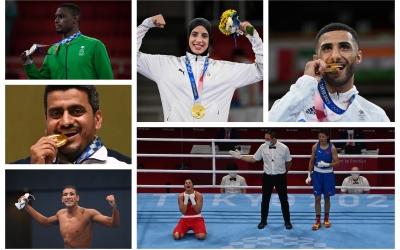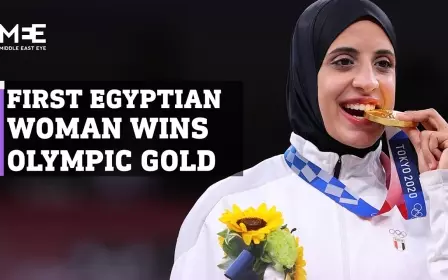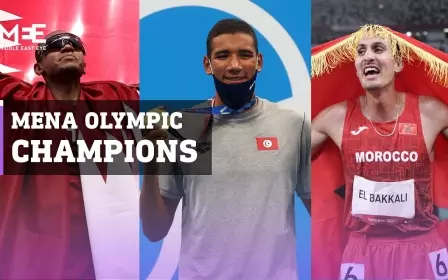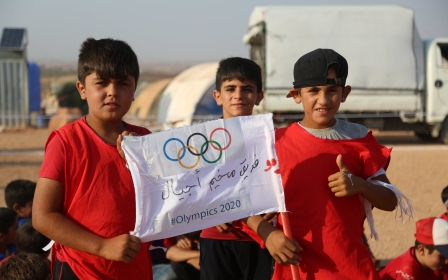Turkey: Karate referee receives death threats for disqualifying Saudi Olympian
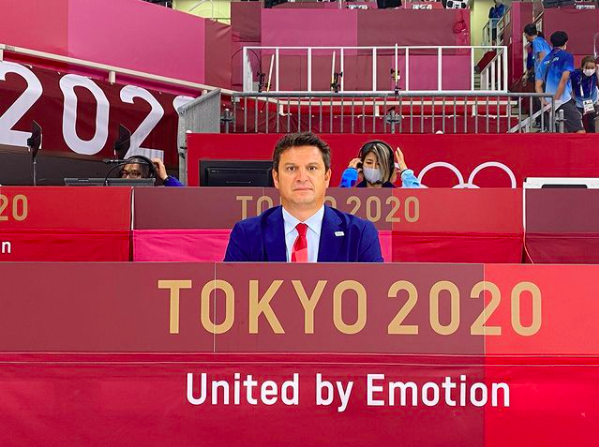
The Turkish referee who oversaw the men's karate final at the Tokyo Olympics on Saturday said that he and his family have been receiving death threats since he disqualified a Saudi player for injuring his Iranian rival.
“They made me part of the fight between Iran and Saudi Arabia. I have nothing to do with it. I believe in sportsmanship and peace,” Ugur Kobas told Middle East Eye (MEE) in a phone interview on Tuesday. “I only followed the rules and there is nothing political about it.”
Kobas, 49, and four other referees jointly disqualified Saudi player Tareg Hamedi after he kicked his opponent, Iranian national Sajad Ganjzadeh, in the neck. The score at the time was 4-1 to Hamedi, who would have won the first gold medal ever in Saudi Arabia's history.
Popular Saudi cartoon on Twitter depicts the Turkish referee as a donkey
New MEE newsletter: Jerusalem Dispatch
Sign up to get the latest insights and analysis on Israel-Palestine, alongside Turkey Unpacked and other MEE newsletters
Kobas said he counted to 10 before calling for a doctor, who said that Ganjzadeh needed to be transferred to a health facility. He left the stage on a stretcher.
“I talked to a second doctor working for the World Karate Federation and the doctor agreed that the Iranian player wasn’t going to be able to complete the game,” Kobas added. “Then four other referees and I unanimously decided to disqualify the Saudi player because the rules require us to do so. “
Kobas said any player who harms his or her rival to the point where they can no longer compete has to be punished.
But Kobas has received hundreds of thousands of hostile messages since the decision. His mailbox is completely full, he has deleted his Twitter account. His Instagram inbox cannot receive any more messages.
“I received 100,000 threatening and insulting messages alone on my photos on Instagram. This is insane,” he said. “They threatened me with death. That’s okay. But then they started to attack my wife and my son, telling them that they would find all of us and kill us.”
One Saudi Twitter user claimed that Kobas “stole the gold medal” from Hamedi because he was one of Turkish President Tayyip Erdogan’s party loyalists. Kobas denies that charge and says the closest he has come to the government is visiting friends over the years who work at the local branch of the ruling Justice and Development Party (AKP) in Sakarya, where he lives.
Translation: Turkish referee "Ugur Kubas" stole the gold medal from Tareg Hamedi because in a nutshell: one of Erdogan's party loyalists, the Justice and Development Party, and here are several photos with members of the party, which prove to us his racism towards Arabs and work to deprive the Saudi hero of gold.
Faisal Abdulkarim, Chairman of the Consumer Awareness Committee at the Riyadh Chamber of Commerce, according to his Twitter bio, tweeted that what Kobas did was a global mockery of the Olympics, writing, “Turkish + Iranian = cheating, fraud and theft."
Saudi accounts also accused Kobas of liking a tweet calling Saudi trolls “Bedouin dogs.” Kobas said he never liked that tweet and that it must have been photoshopped. “Arabs are our brothers whom we lived together with for hundreds of years,” he said. “My son is a Covid patient and he was deeply shaken by these attacks.”
Kobas says people should instead focus on the joy of the Olympics. "This is all about playing and celebrating the sports."
This article is available in French on Middle East Eye French edition.
Middle East Eye delivers independent and unrivalled coverage and analysis of the Middle East, North Africa and beyond. To learn more about republishing this content and the associated fees, please fill out this form. More about MEE can be found here.


